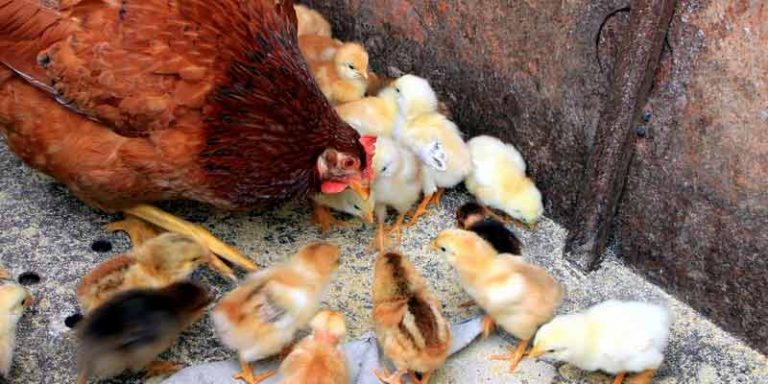In order to produce quality eggs, laying chickens need protein-rich and calcium-rich foods. However, not all foods are appropriate for chickens to eat.
Chick starter is a high-protein, high-nutrient meal for young chicks. So, how can utilizing chick starter feed benefit laying hens? Is it safe for laying hens to consume chick starter feed?
What is Chick Starter Feed?
Chick starter is a kind of feed that contains all the necessary nutrients for day-old layer chickens up to the age of eight weeks. This is a combination of whole-grain or slightly broken grains that are high in protein, energy, vitamins, and minerals to help fluffy newbies grow strong and well.
Starter feed is critical for young chicks, particularly during the first eight weeks after birth. Young chicks need extra protein to build their bones and maintain their immune as quickly as possible. As a result, the high protein content of chick starters, which ranges from 20 to 24 percent, will satisfy their nutritional needs.
Chick starter is also available in the form of crumbles. As a result, feed waste may be reduced, and tiny hens can readily peck and digest them.
Can Laying Hens Eat Chick Starter Feed?
You now have a thorough understanding of the advantages of chick starter feed for young chicks. It’s understandable that many people ask whether they may give chick starters to their laying hens as well.
Yes, chick starter feed is safe for hens to consume. Chick feed, on the other hand, isn’t ideal for layers since it contains too much protein and not enough calcium. For healthy bones and the formation of eggshells, all laying chickens need an additional quantity of calcium. Chick starter alone does not provide enough calcium for hens to produce eggs. Calcium supplements for hens must be obtained from other sources in this instance.
Keep in mind that although layers may consume chick starting, chicks should not consume chicken layer feed. The quantity of calcium in laying hen feed is excessive, yet the protein is insufficient for newborns.
For a limited period, the extra protein in chick starters will not harm adult chickens. However, if hens take a lot of calcium from layer feed, it will affect their digestive tract and create a lot of problems.
What Are The Benefits Of Feeding Chick Starter Feed To Laying Hens?
Superior Nutrient Sources
Chick starter is made out of natural materials including wheat, maize, peas, soybeans, canola, oats, and others. As a result, it has a high protein content to aid weight growth and muscle building.
In addition, starter feed is vitamin and mineral enriched. Essential vitamins and minerals such as A, D3, E, K, B12, calcium, phosphorus, zinc, and others will help a flock of hens thrives.
Folate is one of the vitamins that help to reduce embryo loss during the late stages of incubation. As a result, it would be a tasty reward for laying hens.
A lack of calcium and vitamin D may lead to weak, porous, and brittle bones, which can lead to chicken bone fractures, particularly in older or adult hens.
Calcium, on the other hand, if eaten in excess, may harm the hens’ kidneys. This will not happen with chick starter since all the components are well combined.
Protection Against Common Illnesses
Chick starter feed comes in two varieties: medicated and non-medicated. The medicated feed contains amprolium, which aids in the prevention of coccidiosis in hens. Young hens are susceptible to one of the most prevalent intestinal illnesses.
Chickens who have received the coccidiosis vaccination, on the other hand, should not be given medicated chick starters. The vaccination will be rendered ineffective by amprolium, and birds are susceptible to the illness.
Additionally, some climatic conditions may provide excellent habitat for the growth of cocci. They may combat coccidia by eating a healthy diet and supplementing with herbs like apple cider vinegar (a natural probiotic) and garlic (a natural herb with antibiotic capabilities).
How To Properly Care For Laying Hens
A well-balanced meal helps ensure that your hens have the energy to produce eggs. The protein content of 16-20% and supplemented omega-3 are the typical levels of nutrients. Hens need protein to sustain their energy levels and continue to develop and produce eggs. Omega-3 improves the nutritional value of eggs.
In addition, probiotics should be included in layer feed. The immunological and digestive systems may benefit from prebiotics and probiotics. Calcium and magnesium are required for the formation of robust shells and bones.
Also, bear in mind that in cold regions, you should allow your flocks to remain warm. In hotter regions, you should provide shades for them to stay cool.
Tips To Using Chick Starter Feed
- Chick starter feed should not be a replacement for layer feed. It should only be fed to them as a supplement.
- Ensure that laying hens have access to fresh, clean water at all times.
- Because chick starter feed is perishable, keep it in a cool, dry place.
- Once the feed is opened, place it into a sealed container. This will keep rodents and insects from getting to it.
Conclusions
Is it safe for laying hens to consume chick starters? The answer is yes, it is safe for laying hens to eat. However, you must take care to ensure that they are getting enough calcium in their meals. Laying chickens will produce quality eggs if they get adequate nutrition.
To summarize, chick starter feed contains a broad variety of important nutrients such as vitamins, minerals, and protein, all of which are beneficial to the bone and digestive health of young chicks throughout their first few months of existence. Because of the amprolium content in chick starter feed, it is also used to prevent coccidiosis.
We hope that the material provided above will provide you with a wealth of helpful knowledge.


